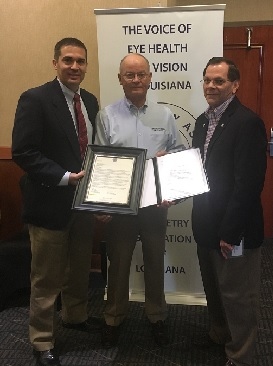Beignets and king cakes are just the beginning of how sweet Louisiana is. The state of Louisiana boasts some of the sweetest laws that support our profession of optometry. The Optometry Association of Louisiana (OAL) has worked hard to promote optometry and widen our scope of practice. While most other states have inclusive laws for optometry, Louisiana operates under an exclusive law.
An inclusive law defines what optometrists can do, whereas an exclusive law defines what optometrists cannot do. Louisiana states, “Optometry is defined by diagnosis and treatment of the eye and adnexa except for…” The beauty of this type of legislation is that optometrists are limited by what they can’t do rather than what they can do, which allows for a much wider scope and more room to grow. This also means that when new procedures are developed, optometry is free to use it without having to build that into the legislature. Act 398 contains 22 procedures that optometrists in Louisiana cannot do, and everything else is within the scope of Louisiana optometry! Here is a quick summary of the optometric scope of practice in Louisiana.
What optometrists in Louisiana CAN do:
- Prescribe any Schedule II, III, IV and V drugs (useful for a fluorescein angiography)
- Perform minor surgical procedures such as chalazion removals
- Perform laser procedures like laser peripheral iridotomies (LPIs), selective laser trabeculoplasties (SLT), and YAG capsulotomies
- Manage and treat glaucoma with topical and oral medications
- Manage pre- and post-operative cataract surgery cases (including post-op cataract laser surgeries)
- Pretty much anything except procedures on the exclusion list! Isn’t the exclusive law awesome!?
What optometrists in Louisiana CANNOT do are the 22 procedures listed in Act 398, some of which include:
- Surgery that requires general anesthesia
- Surgery that involves injection(s) to treat macular or retinal disease
- Refractive surgeries, such as LASIK
- Convinced to practice optometry in Louisiana yet?

Currently, no bills have are being proposed by the OAL. In 2014, the Louisiana board required optometrists to log all laser procedures performed in order to renew the laser license. Over 5,000 laser procedures were performed by optometrists from 2015 to 2016 with no reported negative outcomes! Needless to say, the laser license was renewed and with such positive results like this any opposition to this law would be moot.
Formatting laws to be exclusive provides more freedom for optometry to operate medically. As commercial optometry is being targeted by internet sales and online refractions, the profession would be wise to adapt. Battling these opposing forces impinging on the optical and refractive aspects of our scope is important, but optometry should continue establishing its medical forte to ensure a successful future. Exclusive laws are conducive to this effort and hopefully other states follow suit with Louisiana.
A special thanks to Dr. James D. Sandefur, Executive Director of the Optometry Association of Louisiana, for providing information for this article. Dr. Sandefur also had the of honor of recently being inducted to the Optometry Hall of Fame this year.

